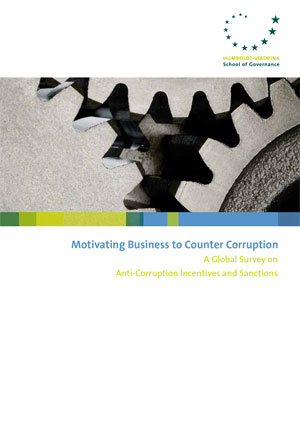 Recent years have seen a steady increase in the acknowledgment of the important role businesses play in the global fight against corruption. This has manifested itself in a likewise increasing number of business- oriented anti-corruption initiatives as well as the establishment of business specific anti-corruption legislation (e.g. corporate offense clause for failing to prevent bribery in the UK Bribery Act 2010). In the context of these developments a debate is emerging about (external) mechanisms that could motivate businesses to counter corruption and how different societal actors could use and target these motivations.
Recent years have seen a steady increase in the acknowledgment of the important role businesses play in the global fight against corruption. This has manifested itself in a likewise increasing number of business- oriented anti-corruption initiatives as well as the establishment of business specific anti-corruption legislation (e.g. corporate offense clause for failing to prevent bribery in the UK Bribery Act 2010). In the context of these developments a debate is emerging about (external) mechanisms that could motivate businesses to counter corruption and how different societal actors could use and target these motivations.
So what is it that motivates businesses? Is it severe penalties from regulators? The exclusion from lucrative projects and markets? Or are businesses motivated by rewards for good anti-corruption behavior (to a point where it sets them apart from their peers)? Or is it maybe a combination of the ‘stick’ (sanctions) and ‘carrot’ (incentives) approach?
The initiative ‘Anti-Corruption Incentives and Sanctions for Business’ at the Berlin-based HUMBOLDT-VIADRINA School of Governance seeks to provide answers to these questions. It analyzes existing and potential anti-corruption incentives and sanctions in order to provide external stakeholders (governments, business partners, civil society organizations etc.) with information on what they can do to motivate businesses to engage against corruption.
In the context of this initiative a global survey has been published, reflecting the views of 223 international anti-corruption experts from the Business Sector, Public Sector, and Civil Society.
In general, respondents believe more in the “stick approach” than in motivating businesses through rewards. Restricting business opportunities and operations as well as imprisoning business representatives were considered to be the most effective mechanisms to counter corporate corruption. Not surprisingly, governmental institutions were considered the most important stakeholder in setting incentives and sanctions. With regard to regional distribution, some reputational mechanisms were rated higher on average in developing countries, which could be explained by the relative lack of efficient law enforcement in many of these countries.
However, the survey also provided some more surprising results. An overwhelming 92% of respondents agreed that preferential treatment should be applied to companies that demonstrate adherence to anti-corruption principles (with procurement as the most important area to apply such treatment). This shows that respondents not only believe in punishment of wrong doing, but also in rewarding companies that apply good practice standards with tangible rewards. Also notably, a distinct majority of respondents agreed that a public corruption ranking for businesses should be established, a view shared by a clear (if slightly less considerable) majority of business respondents. This again provides companies with the opportunity of setting them apart from their peers.
Overall, answers from the business sector, the public sector and civil society did not diverge as much as one might have expected. This can be considered a promising conclusion as it will take concerted and decisive effort by all actors of society to successfully fight a problem as complex and wide-spread as corruption.
For more information about this initiative and to download the full survey report please visit www.humboldt-viadrina.org/anti-corruption















 Connect with us on Facebook
Connect with us on Facebook Follow us on Twitter
Follow us on Twitter